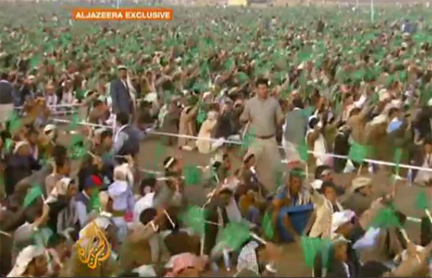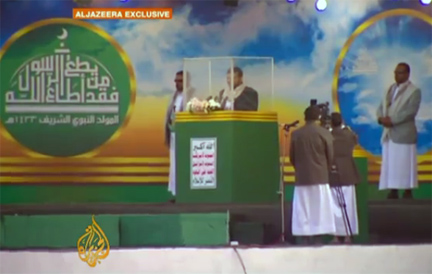
Huthi political rally near Sa’da this week
The ongoing political turmoil in Yemen has been overshadowed, and understandably so, by the increasing bloodshed in Syria, soccer riots in Egypt and lingering resistance by a few Qaddafi supporters in Libya. The past year of protests and revolution, unprophecied by political pundits, reminds me of a giant tire with so many holes that it is impossible to stop the air from escaping, even when one hole seems to be plugged. Meanwhile the road gets bumpier and bumpier in Yemen. Now for the latest recap… about-to-be-former President Ali Abdullah Salih is still in New York receiving medical treatment. He is in principle immune from prosecution, but certainly not immune from the continuing opposition to the excesses of his long rule in Yemen. A recently infused political form of Islam, known as Ansar al-Shari’a (with its own Facebook page) has all but replaced the infamous name Al-Qaida, in the south. The upcoming election, with one emerging compromise candidate for President, hardly seems headed for a democratic exercise apart from name only. Several aid workers were captured earlier this week and then released. And, behold the Huthis…
Al-Jazeera posts a video of a celebration of the Prophet Muhammad’s birthday in a remote area outside of the northern city of Sa’da. There on a platform etched against a barren landscape, a region less vibrant after almost eight years of conflict with the government that has left the ancient town of Sa’da in tatters, stood Abd al-Malik al-Huthi, the leader of the rebellion. Reports of his death at the hands of a government raid in 2009 are, as Mark Twain once noted about a premature obituary for himself, greatly exaggerated. While I do not doubt the sincerity of those present who celebrated the birth of the Prophet, the political flavor of the event certainly dominated the scenes shown on al-Jazeera.

Abd al-Malik al-Huthi speaking near Sa’da this week
To most outside observers the various political voices raised in Yemen against the regime of Salih tend to be merged into a bundle called “Islamism” with a strong sense that the real culprits are those die-hard al-Qaida agents. [For an excellent appraisal of al-Qaida in Yemen, see the report published by the Combating Terrorism Center at West Point]. Yemen being a Muslim-majority, overwhelmingly so, it should not be a surprise that Islam is a major form of identity. But politics contort the values of every kind of faith, not just that of those who celebrate the birth of the Prophet Muhammad. Anyone who studies the historical sweep of Islam can readily see that there was never a time since the death of the Prophet when there was clear agreement within the Umma. How could it be otherwise, given the diverse forms of identity socially and culturally constructed? The same can be said for any major religion. Even if you think Marx was off the mark in claiming that man makes religion, you must admit that man (and occasionally a woman) distorts religion all the time.
The Huthi rebellion is very much about a travesty of justice, at least for those who belong to the movement. It is not about reviving the millennial experience of the Zaydi Imamate, nor about establishing a new caliphate. Yemen is not about to host a second Shi’a-dominated theocracy. The anti-American rhetoric is there, with good reason given that Salih used much of America’s military aid against his political foes and not on the “terrorists” for whom it was targeted. Unlike Bin Laden, whose original Al-Qaida was headquartered in a foreign land, the leader of the Huthi movement has a stake in rebuilding his own country. Their problem is with the Salih regime, not their fellow Yemenis. Thus, it is not surprising that the Huthis recently formed a political party to participate in the evolving political process. Their activities can be followed online on the website http://ansaruallah.net.
The media focus on Al-Qaida in Yemen obscures the complicated dynamics of the evolving political processes in Yemen. Yes, there are former allies of Bin Laden who happened to be Yemeni and returned to their homeland, but the few who have tried to carry on the fight have not made much headway in damning the United States as the number one problem. Whatever you want to call the various political groups chanting “Allahu Akbar,” remember that their primary goal is to free Yemen from the oppression of the dictatorial state which Salih ran. There is a long list of grievances in the south, as there are in the north. Yemen is also an extremely poor country on an extremely rich peninsula, unemployment is staggering and human development indicators have tanked. No one cause can explain the current turmoil, nor be used to predict the outcome of the revolution that has brought down, almost, the Salih regime. But, do not count out the Huthis as a major player in the coming year.
Daniel Martin Varisco